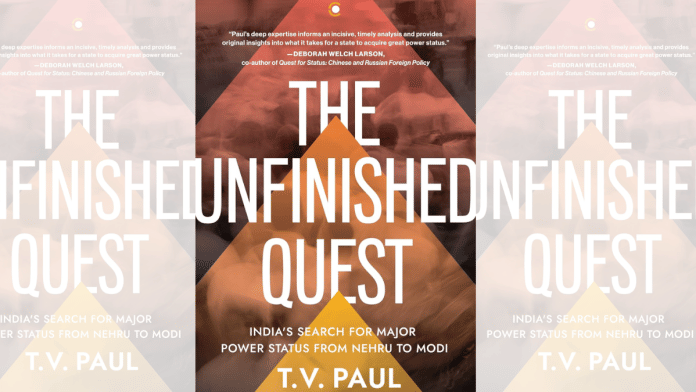‘The Unfinished Quest: India’s Search for Major Power Status From Nehru to Modi‘, the latest book by political scientist T.V. Paul, delves into India’s complex and evolving role in the global geopolitical landscape. The book traces India’s aspirations to enhance its global stature, beginning with the vision of its first Prime Minister, Jawaharlal Nehru, and continuing through successive leaderships, including the current era under Prime Minister Narendra Modi.
Paul evaluates India’s progress using key benchmarks—economic growth, military strength, human development, and international diplomacy—while analyzing the challenges that continue to hinder its rise. Drawing on decades of scholarship, Paul combines historical data, government policies, and interviews with key figures in India’s foreign policy ecosystem to provide a detailed assessment of India’s position as a “swing power” in the Indo-Pacific. He highlights India’s efforts to counterbalance China’s rise while navigating domestic challenges such as inequality, underdeveloped infrastructure, and the need to fully utilize its demographic potential.
“This work examines India’s potential to play a stabilizing role in the Indo-Pacific and beyond amidst significant global shifts. However, achieving true major power status requires addressing critical internal challenges,” said T.V. Paul.
Paul charts India’s uneven rise since its independence in 1947, exploring its successes and failures. He contextualizes India’s journey within the broader framework of status competition and power transitions, focusing particularly on its rivalry with China. The book argues that India’s rise will depend on its ability to balance hard and soft power, address domestic shortcomings, and evolve as an inclusive democracy capable of leveraging its human capital.
He explores the paradox of India being the world’s fifth-largest economy, surpassing the United Kingdom in 2022, while still grappling with issues like inequality and underdeveloped infrastructure. He argues that India’s rise depends on balancing hard and soft power, addressing domestic shortcomings, and evolving as an inclusive democracy capable of maximizing its human capital.
The book has been described as “the definitive account of India’s rise in the international order” and “a must-read for anyone seeking to understand the dynamics of power transitions in the 21st century.”
Brendan Simms from The Wall Street Journal called the book “instructive and stimulating,” while Ashley J. Tellis, Tata Chair for Strategic Affairs at the Carnegie Endowment for International Peace, remarked, “Understanding how status-seeking relative to other material aims shapes the pursuit of great-power status is a tricky analytical enterprise. Yet T.V. Paul’s ‘The Unfinished Quest‘ persuasively demonstrates that India’s ambition to scale the international hierarchy cannot be understood without appreciating its quest for global standing. His assessment of what prevents this elevation is spot on and deserves careful consideration in New Delhi.”
Avatans Kumar of India Currents praised the book as “an insightful examination of India’s unfinished journey towards becoming a significant power on the global stage.”
T.V. Paul is the Distinguished James McGill Professor of Political Science at McGill University and a leading scholar in international relations. He has authored or edited 24 books, including Restraining Great Powers: Soft Balancing from Empires to the Global Era (Yale University Press, 2018) and The Warrior State: Pakistan in the Contemporary World (Oxford University Press, 2013).
Also read: New Book explores how religious, political slogans have shaped India’s discourse, fuelled division






